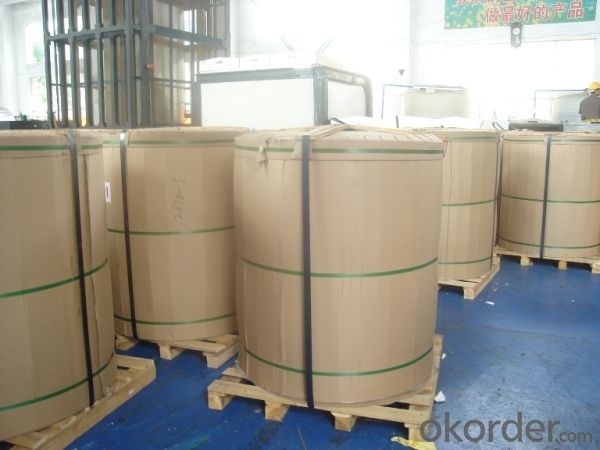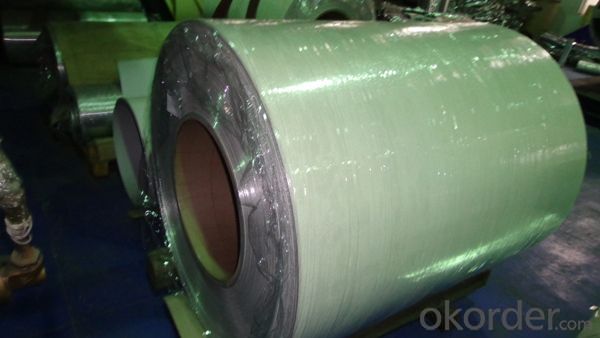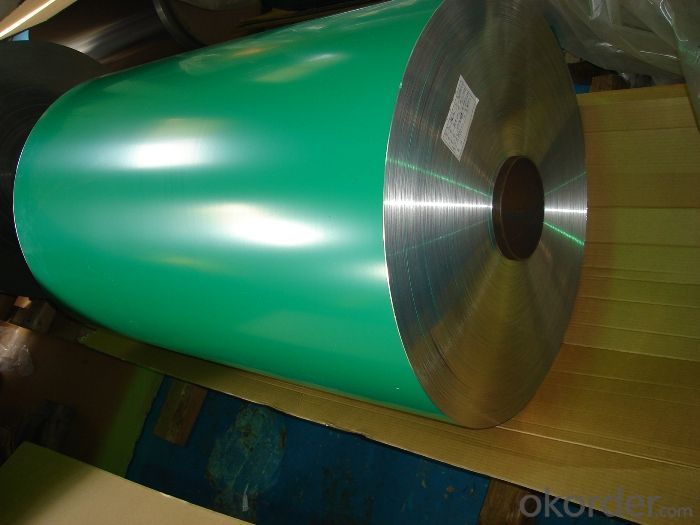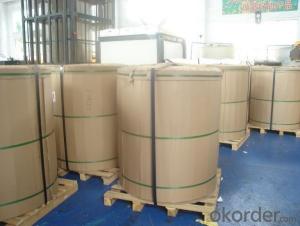PVDF Coating Aluminium Coils for ACP Application with High Quality
- Loading Port:
- Shanghai
- Payment Terms:
- TT OR LC
- Min Order Qty:
- 5 m.t.
- Supply Capability:
- 200 m.t./month
OKorder Service Pledge
OKorder Financial Service
You Might Also Like
Item specifice
1. Structure of PVDF Coating Aluminium Coils for ACP Application with High Quality
PVDF coated aluminum coils are with excellent acid-resistance and alkali-resistance. They are green decoration materials with characters of environment protection, flame-resistance, and groovy colors. In nowadays, the color coated aluminum coil has become the popular material for top grade decoration.
Color coated aluminum coils are widely used for aluminum composite panels. We normally use alloy 3003 and temper H16.
We have different colors for aluminum composite panels. RAL numbers are no problem for us. We also can adjust coating according to color of customers and offer personalized services.
2. Main Features of PVDF Coating Aluminium Coils for ACP Application with High Quality
• Light Weight
• Good in strength and rigidity
• High Flatness
• Good Weathering
• Colorful
• Recycling
• Saving Energy
• Rust proof
3. PVDF Coating Aluminium Coils for ACP Application with High Quality Images



4. Specification of PVDF Coating Aluminium Coils for ACP Application with High Quality
ALLOY | TEMPER | THICKNESS | WIDTH | COATING and COLOR |
3003, 3105, etc | H44, etc | 0.2-0.6mm | Less than1600mm | AS PER YOUR REQUIREMENTS |
5. FAQ
A.What about inspections to guarantee quality?
For each order, we will arrange strict inspection for raw materials, inspection during production and inspection for finished goods.
With requirement of customers, we also can arrange the third party inspection.
B.What about delivery?
We will put order in production schedule after order gets confirmed against copy of TT or L/C. Normally it takes about one month for production. Exact shipment schedule is different based on different sizes and quantity.
C.What is the MOQ?
5 tons for each size.
D. Where have you exported?
We have exported to many countries. Main markets include South East Asia, Middle East, North America, South America, etc.
- Q:Can aluminum coils be used in automotive suspension systems?
- Automotive suspension systems can utilize aluminum coils. Aluminum, a lightweight and sturdy material, provides numerous advantages for suspension components. Its high strength-to-weight ratio allows it to handle heavy loads without burdening the vehicle with unnecessary weight. This can enhance fuel efficiency and overall performance. Furthermore, aluminum is resistant to corrosion, making it particularly valuable for automotive suspension systems exposed to harsh weather conditions and road debris. By incorporating aluminum coils, manufacturers can ensure that suspension components have a longer lifespan and require less maintenance. In addition, aluminum coils possess superior heat absorption and dissipation capabilities compared to materials like steel. This aids in preventing overheating and mitigating the risk of suspension failure, especially during intense driving conditions or off-road usage. However, it is important to note that the use of aluminum coils in automotive suspension systems may entail certain compromises. Although aluminum is lighter and more resistant to corrosion, it may not be as strong as steel. Therefore, manufacturers must meticulously design and engineer the suspension system to ensure it can withstand necessary loads and provide sufficient support and stability for the vehicle. In summary, aluminum coils can be effectively employed in automotive suspension systems, offering benefits such as lightweight construction, corrosion resistance, and efficient heat dissipation. Nevertheless, manufacturers must carefully consider the specific requirements and trade-offs associated with aluminum usage in suspension components to ensure optimal performance and safety.
- Q:Can aluminum coils be used in the production of aluminum curtain walls?
- Indeed, aluminum coils possess the capability to be utilized in the fabrication of aluminum curtain walls. In the manufacturing procedure of aluminum curtain walls, it is customary to employ aluminum coils as the primary material. These coils are subjected to various processes, such as rolling, cutting, and shaping, in order to fashion the desired components of the curtain wall system. Due to its lightweight nature and resistance to corrosion, aluminum proves to be an optimal substance for curtain walls, as it imparts both structural stability and durability to the building facade, along with an appealing aesthetic. In essence, aluminum coils assume a vital role in the creation of aluminum curtain walls, guaranteeing the excellence and functionality of the end product.
- Q:Are aluminum coils more cost-effective compared to other materials like copper?
- Yes, aluminum coils are generally more cost-effective compared to other materials like copper. There are several reasons for this. Firstly, aluminum is a more abundant metal than copper, which makes it cheaper to produce. This abundance also means that aluminum prices tend to be more stable and less prone to fluctuations in the market, further contributing to its cost-effectiveness. Secondly, aluminum coils have a lower density compared to copper coils, resulting in lighter weight units. This lighter weight not only reduces transportation and installation costs but also makes aluminum coils easier to handle and maneuver during the manufacturing process. Additionally, aluminum coils have excellent thermal conductivity properties, which means they can effectively transfer heat. This allows for more efficient cooling or heating systems, resulting in lower energy consumption and operating costs over time. Moreover, aluminum has a higher resistance to corrosion compared to copper, making it more durable and requiring less maintenance. This increased lifespan of aluminum coils reduces replacement and repair costs, further enhancing their cost-effectiveness. Lastly, aluminum coils are recyclable, and the recycling process requires significantly less energy compared to producing new aluminum. This aspect contributes to the overall sustainability and cost-effectiveness of aluminum coils. Overall, considering the lower production costs, lighter weight, superior thermal conductivity, increased durability, and recyclability, aluminum coils are indeed more cost-effective compared to other materials like copper.
- Q:What are the common testing methods for aluminum coils?
- Some common testing methods for aluminum coils include visual inspection, dimensional measurements, hardness testing, corrosion resistance testing, tensile strength testing, and conductivity testing. These methods help ensure the quality and performance of aluminum coils in various applications.
- Q:Are there any specific installation requirements for aluminum coils?
- Yes, there are specific installation requirements for aluminum coils. When installing aluminum coils, it is important to consider a few factors. Firstly, it is crucial to ensure that the coils are properly supported and secured during installation. Aluminum coils can be quite heavy, so adequate support is essential to prevent sagging or damage. This may involve using appropriate brackets or support structures to ensure the coils are securely mounted. Secondly, it is important to consider the location and environment where the coils will be installed. Aluminum coils are often used in HVAC systems, and it is crucial to ensure that the installation area is free from any corrosive substances or chemicals that could potentially damage the coils. Additionally, proper ventilation should be provided to prevent any buildup of heat or moisture, which can affect the performance and lifespan of the coils. Furthermore, it is essential to follow the manufacturer's guidelines and recommendations for installation. This may include specific instructions regarding the type of fasteners or connectors to use, proper spacing between coils, and any other specific requirements for the particular aluminum coil being installed. Adhering to these guidelines will ensure the optimal performance and longevity of the coils. Lastly, it is highly recommended to have the installation of aluminum coils carried out by a professional who is experienced in handling and installing these components. This will ensure that the installation is done correctly, minimizing the risk of any issues or damage that may arise from improper installation. In summary, specific installation requirements for aluminum coils include proper support, consideration of the installation environment, adherence to manufacturer guidelines, and professional installation. Following these requirements will help ensure the optimal performance and longevity of the aluminum coils.
- Q:What are the common packaging options for aluminum coils?
- The common packaging options for aluminum coils include wooden pallets, steel frames, and cardboard boxes.
- Q:Can aluminum coils be used in extreme temperature conditions?
- Yes, aluminum coils can be used in extreme temperature conditions. Aluminum has a high melting point of 660.32°C (1220.58°F) and can withstand extreme heat without deforming or melting. Additionally, aluminum has excellent thermal conductivity, allowing it to quickly transfer heat away from the coil. This makes it suitable for various applications, including air conditioning, refrigeration, and heating systems that may encounter extreme temperature conditions. Moreover, aluminum coils are lightweight and corrosion-resistant, making them a preferred choice in many industries.
- Q:What are the different coil widths available for aluminum coils?
- The coil widths available for aluminum coils can vary depending on the specific requirements and manufacturing capabilities. However, common standard coil widths for aluminum coils typically range from 12 inches (304.8 mm) to 60 inches (1524 mm). These standard widths are commonly used in various industries, including construction, automotive, and packaging. In addition to the standard widths, manufacturers can also provide custom coil widths to meet specific customer needs. These custom widths can be narrower or wider than the standard range, allowing for more flexibility in design and application. It is important to note that the availability of specific coil widths may vary depending on the supplier and the specific aluminum alloy being used. Therefore, it is recommended to consult with a reputable aluminum coil supplier to determine the exact range of coil widths available for a particular project or application.
- Q:I would like to know why the ionic substance aluminium oxide doesn't dissolve in water.
- Aluminium gives away 3 electrons, and two aluminium atoms are combined with 3 oxygen atoms, the charge is just to great for it to gracefully dissolve.
- Q:What is the structure of Aluminium Chloride at 180, 192.4 (melting point) and 200 degrees celsius? When does it exist as an ionic lattice and when as a Al2Cl6 dimer?
- Aluminium chloride sublimes (turns straight from a solid to a gas) at about 180°C. If it simply contained ions it would have a very high melting and boiling point because of the strong attractions between the positive and negative ions. The implication is that it when it sublimes at this relatively low temperature, it must be covalent. The dots-and-crosses diagram shows only the outer electrons. Hope that help Check here for more information; www.chemguide .uk/atoms/bonding...
1. Manufacturer Overview |
|
|---|---|
| Location | |
| Year Established | |
| Annual Output Value | |
| Main Markets | |
| Company Certifications | |
2. Manufacturer Certificates |
|
|---|---|
| a) Certification Name | |
| Range | |
| Reference | |
| Validity Period | |
3. Manufacturer Capability |
|
|---|---|
| a)Trade Capacity | |
| Nearest Port | |
| Export Percentage | |
| No.of Employees in Trade Department | |
| Language Spoken: | |
| b)Factory Information | |
| Factory Size: | |
| No. of Production Lines | |
| Contract Manufacturing | |
| Product Price Range | |
Send your message to us
PVDF Coating Aluminium Coils for ACP Application with High Quality
- Loading Port:
- Shanghai
- Payment Terms:
- TT OR LC
- Min Order Qty:
- 5 m.t.
- Supply Capability:
- 200 m.t./month
OKorder Service Pledge
OKorder Financial Service
Similar products
New products
Hot products
Related keywords






























